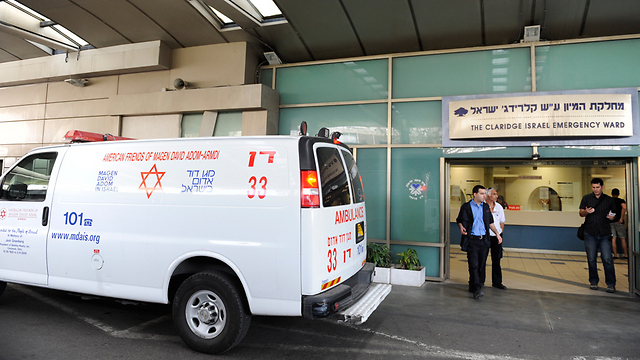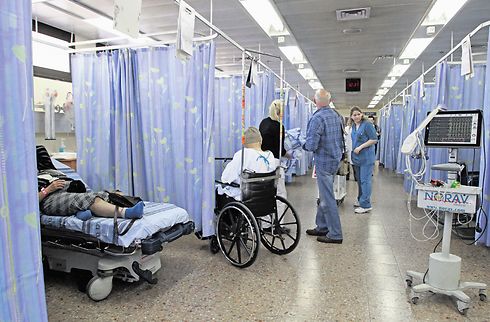
Israel facing doctor shortages, rising life expectancy
Report published by Health Ministry comparing Israel's health system to OECD countries finds low suicide rates compared to developed world, while diagnostic machinery and other resources significantly lacking.
A report published this week by the Ministry of Health reveals a mixed picture about the state of Israel’s health services compared to OECD countries, showing a declining number of doctors, a shortage of hospital beds, but a long life expectancy.
A ratio of 3.1 doctors are employed for every 1,000 people in Israel, marking a decline since last year when the rate stood at 3.4 per 1,000 people, according to the report entitled "Israel's health system compared to the countries in OECD,"
The statistic puts Israel below the OECD average that stands at 3.3 doctors per 1,000 people. The top spot on the list is occupied by Austria with 5.1 per 1,000 people, while South Korea lags behind in last place with 2.3 doctors.
Compared to other OECD countries, the percentage of nurses is also low in Israel, which trails at the fourth lowest position with 5 nurses per 1,000 people. Norway clinches first place with 17.5 nurses, while Mexico came in last last with 2.9.
Israel also performs poorly when it comes to the number of medical studies graduates, with 6.8 graduates per 1,000 people compared to an OECD average that stands at 12.1, with Ireland taking the top spot at 24.4 per 1,000 people.
By contrast, Israel takes the top spot when it comes to medical graduates who studied overseas, with 58.1 percent, while the average stands at merely 20.3 percent, according to the report, which was written written by Meir Baruch and Dan Kinney from the Health Ministry.
The report also shows that the hospitals are suffering from a shortage in the numbr of hospital beds per 1,000 people.
While the average rate in the developed world stands at 3.6 beds per 1,000 people, Israel falls short with 2.3 beds, a figure that remains unchanged since last year despite promises by authorities to fill the gap. Japan and Mexico take first and last spots at 7.8 and 1.5 beds per 1,000 people respectively.
Overcrowding in Israeli hospitals is reflected by the fact the country is placed second when it comes to hospital occupancy rate with 93.8 percent, when the OECD average is 75.5 percent. The bottom of the list is occupied by The Netherlands with 59.2 percent.
The situation is not much more encouraging when it comes to diagnostics devices. Israel ranks third lowest when it comes to the number of MRI devices—4.9 devices per one million people, with the average rate being 15.8. Despite the bleak statistic, an increase in the number of devices in Israeli hospitals has been increased since last year.
The US comes in first, the report says, with 36.7 MRI machines per one million people, while Mexico once again limps in last with 2.6.
A giant discrepancy is also noted in the report when it comes to CT devices in Israel—with 9.7 devices per one million people, while the average is almost triple that number—24.7. Australia is leading the pack with 63 per one million people.
The report also shows that Israel is home to one of the largest populations, in the developed world, of smokers over the age of 15 at 19.6 percent. The average rate in the developed world stands at 16.4 percent.
However, the report drew a more optimistic conclusion when it came to the consumption of alcohol. According to the findings, alcohol intake in Israel by people over the age of 15 per year is only 2.6 litres, wedging Israel in the second lowest slot on the list, with the average rate being 8.8 litres.
Other positive points were indicated by the report, which shows that the average life expectancy rate in Israel of 82.5 years is one of the highest in the world. The OECD average life expetancy is 80.8 years.
Women are expected to live longer than men in Israel, the results show, with an average life expectancy of 84.2 years and 80.7 years respectively. The average life expectancy for men and women in OECD countries stands at 78.1 and 83.4 respectively.
Israel, however, trails behind Japan, where people live the longest on average until 84.1. The lowest life expectancy exists among the LGBT community with 74.7 years.
Israel takes first prize for the highest number of births in the OECD, with an average of 3.1 children per woman. The average for the developed world stands at 1.7.
The infant mortality rate in Israel is also lower than the average in the developed world, with 3.1 infant deaths per 1,000 births versus 3.8 in OECD. Mexico has the highest infant mortality rate (12.1), while Iceland suffers the highest rate with 0.7 infant deaths per 1,000 births.
Israel comes in second lowest on the list when it comes to suicide rates, with 4.1 suicides per 100,000 people against an average of 12.4 in OECD countries. The suicide list is topped by South Korea with 26.5 suicides, while Turkey appears at the bottom with only 2 suicide deaths per 100,000 people.
Deputy Health Minister MK Yaakov Litzman, commented on the report emphasizing the positive aspects.
“The OECD has proven once again that life expectancy in Israel is one of the highest in the world. Many indicators show improvements and we can see the results of the increased investment in the public health system. I’m convinced that in the upcoming years this trend will continue,” said Litzman.
Health Ministry’s Director General, Moshe Bar-Siman-Tov, addressed the report’s more negative aspects.
“The OECD data paints a very complicated picture of our health system. The health itself is at the top of the OECD list. However, with regards to infrastructure and resources, a serious improvement is required, in addition to improvements we’ve already made," he said.
"The report underlines challenges the health system is facing, which require our attention, especially in light of the accelerated aging of the population,” concluded the director general.













